We regularly publish some great healthy living tips, new recipes and other Prune tidbits on our blog
Science & Research
50% of all New Year’s Resolutions Fail – Will yours?
Posted Thu, Jan 09, 20 by Sunsweet
This New Year, why not resolve to do something a little bit different? You could resolve to treat yourself well with delicious food that is super-nourishing, too. You could resolve to create a plan of activity for your family that is, primarily, fun. And who knows? Maybe, just maybe, this year's resolutions will be the ones that you'll actually keep!

How to move your New Year’s resolutions into the 50% that succeed!
How many times have we all proclaimed (almost brazenly!) – to ourselves and to friends - lists of positive, well intentioned New Year's Resolutions which we ‘resolve to include in our lives with energy, spirit, enthusiasm, passion and intent, and yet, statistically many resolutions are set to fail, before they’ve actually commenced! An American study published in the Journal of Clinical Psychology estimated that, every New Year, some 50 percent of the population makes resolutions around things like weight loss, exercise, smoking and finances but 6-8 weeks later their promises are backsliding.
And yet, thankfully, Hope Springs Eternal.
So what can we do, to give ourselves a better chance of maintaining our resolve?
Create an ‘Area of Focus’
Peter Bregman, writing in the Harvard Business Review, has offered insights into why the setting of specific goals often fail; ‘we’re taught to make them very specific, very measurable and time-bound .... but it turns out that those very characteristics are precisely the reasons goals can backfire’. Indeed, 6-8 weeks on when we haven’t met those high achieving goals we confidently proclaimed at the start of the New Year, we frequently begin to cheat, bluff ourselves, and lose momentum!
Bergman proposes: ‘Instead of identifying goals, consider identifying Areas of Focus’.
- an Area of Focus establishes activities you want to spend your time doing; a goal defines an outcome you want to achieve.
- an Area of Focus is a path; a goal is a result.
- an Area of Focus settles you into the present; a goal points to a future you intend to reach.
And the beauty of the final outcome is that by narrowing the focus, our resolve becomes real and habit forming.
And we can certainly see the benefits of aiming to maintain a healthy lifestyle rather than introducing harsh exercise regimes and punitive crash diets. It makes sense for healthy habits to be an everyday part of life rather than things that are introduced in a panic on the first of January only to be abandoned a short time later. Having a buddy to support you in your healthy endeavours is an excellent idea, too. You can share hints and tips. You can celebrate successes and learn from failures. You can cheer each other on, to keep focused and stay committed, when the going gets tough.
Five inspirational tips
If you're in need of a little inspiration, our Healthy Living Guide is an excellent place to start.
If you rely on your motivation alone, that life-affirming, energy-boosting, healthy-weight-maintaining exercise session may never happen! So here are 5 tips on creating a winter activity plan that will help you keep to your Area of Focus in check.
- Change your behaviour by changing your thinking – exercise isn't a chore, it's fun!
- Dig out the high-vis, a brisk walk can be refreshing on a cold and crisp evening.
- Discover your inner child. If we're lucky enough to have snow, get out there and play!
- Sign up for a course. Something fun, like a jive class. Something soothing, like yoga. Whatever floats your boat.
- And finally, if the weather really is too foul to leave the house, YouTube is chock-full of workout videos for all ages, tastes and fitness levels.
5 Top Tips on Comfort Eating ... without piling on the pounds!
Posted Thu, Jan 16, 20 by Sunsweet
So, what do you think…is it really possible to indulge yourself with tasty, comforting and warming food, without piling on the pounds? Or, come the summer, do you fully expect to be dieting? At Sunsweet, we believe that comfort does not necessarily have to mean calorific.

5 Top Tips on Comfort Eating...without piling on the pounds!
Gaining weight. It's something that most of us accept as “just one of those things”. The World Health Organisation reports that more than 1.4 billion adults are overweight, the findings of which could prove to be very significant.
Why do we crave Comfort Food in winter?
Comfort Foods tend to be high in carbohydrate and sugar, and there are lots of theories about why we crave these heavier foods more in the winter months. There's a school of thought that winter weight gain could be our survival instinct kicking in; that we're fattening ourselves up to get through the colder months and keep our mood buoyant. And there's another more practical thought: when the days get shorter and temperatures drop, our resolve for healthy living plummets and we descend into a circle of eating more, moving less and, ultimately, gaining weight.
So what can be done to counter the sluggishness caused by overindulging?
Our 5 top tips
Plan ahead to maximise meal-times and super-charge your snacks
- Seize the opportunity to stock up the store cupboard with more nutritious snack alternatives. Dried fruit – like Sunsweet prunes – keep well, pack a nutritious punch and are surprisingly versatile adding a rich, fruity depth to both sweet and savoury dishes.
- Plan meals ahead – and, where possible, prepare them in advance - so that “I’m starving” feeling doesn't automatically equate to grabbing something quick, calorie-laden and unhealthy. Soups and stews are nourishing and warming and if you choose your recipe wisely can be low in fat and calories, and high in taste and comfort, too. Our Minestrone with Prunes Soup is a lovely veggie option with less than 300 calories.
- Drinks and snacks can be tasty, little pick-me-ups. But the ‘easy-to-reach’ sugar laden snacks and super-sized coffees can be a disaster, calorie-wise. High-fibre snacks served with a warm drink – herbal teas are perfect - can help to fuel the body and keep everything moving. And an attractively presented plate of fruit, fresh or dried, couldn't be simpler or quicker.
- Life would feel pretty dull without the occasional treat. And from time to time, if you really fancy something chocolatey, there's nothing sinful about giving in to temptation. Do a bit of research though to come up with healthier alternatives. Our Paleo Chocolate Pudding is an excellent example of a treat that is flavourful, tempting, looks great, and under 410 calories, too!
- Naturally sweet, prunes and prune juice have no added sugars, just naturally-occurring ones; a quick and easy way to keep sweet cravings at bay. Also did you know that a prune puree (blitzing the fruit with water) can be used to successfully replace fat in cakes and cookies? You can find out more, here. And, finally... A warm bath. Super-cosy PJs. Flickering candlelight. A roaring fire. And a good old-fashioned hug. Totally Comforting, Totally Indulgent. Totally Calorie Free!
Enjoy!
A Beginner's Guide to...Breakfast
Posted Fri, Jun 11, 21 by Sunsweet
Skipping breakfast. It's the obvious way to cut back on calories, isn't it? Well, think again. Skipping a meal can lead to less energy, reduced levels of physical activity and – ultimately – weight gain. Read on and let our Beginner's Guide to Breakfast help you – and your family - to get every day off to a Sunsweet start!

Breakfast – what's the big deal?
America's National Weight Control Registry investigates weight loss programmes on a statistically significant scale. And registered dietitian Kristin Kirkpatrick observed, from the Registry's findings, that “more than 70 percent of people who have lost weight and kept it off include eating breakfast among their daily habits”. Evidence published in the American Journal of Clinical Nutrition found that those who ate breakfast, in a clinical trial, used more energy through physical activity than those who skipped the meal.
But can skipping meals be a way to aid weight loss?
Skipping meals, any meal, is not a good idea because it can result in tiredness - making you less likely to have the energy for physical activity, feeling over-hungry and make you more likely to choose unhealthy snacks to fill up on. If we're honest with ourselves, we innately know that to maintain a healthy weight, you need to balance the number of calories you consume through food, with the number of calories you burn off through exercise. It's pretty straightforward, really!
Prunes; a welcome boost towards your five-a-day
Our diet has an enormous impact on both our physical and our emotional wellbeing and a common-sense attitude towards healthy eating is crucial. Breakfast is an excellent opportunity to squeeze in a few extra portions of fruit and veg and this can give the boost towards five-a-day that many of us so desperately need!
Sweet and super-tasty, prunes are high in fibre, virtually fat-free, contain only naturally occurring sugars and are an excellent source of many nutrients making a valuable contribution towards a healthy, balanced diet. When time is short and you have no real choice but to eat your breakfast on the run, prunes – enjoyed straight from the pack – offer a convenient, and yet healthy, option. And, when time is on your side, prunes can really come into their own at breakfast-time.
Wow the family at breakfast-time – with prunes!
- A handful of prunes – roughly chopped – make a deliciously fruity addition to your family's favourite breakfast cereals. They'll help to up your nutrient quota, early doors, and be a great start towards your five-a-day goal.
- Pureeing the fruit and spreading it on warm toast makes for a simple, satisfying and super-tasty start to the day.
- Whizzed together with your choice from a selection of fresh fruits, yogurts, juices and dairy or non-dairy milks, prunes can bring a wonderful depth of flavour to smoothies.
You can find more delicious Breakfast recipe inspiration by searching under the Breakfast category on our recipe page.
Now doesn't that sound worth leaping out of bed for?
Please Note: Prunes are good for digestion and help keep you regular, when 100g are eaten as part of a varied and balanced diet and an active lifestyle. Always consult a GP if you have any health concerns.
A side order of body confidence – just in time for summer!
Posted Fri, Jun 11, 21 by Sunsweet
Poor body image; it can be a barrier to both happiness and health, so why not play to your strengths and bag yourself a whole load of body confidence .... just in time for summer. And we'll let you into a little secret: it's as much about your mind as it is about your body!

Embracing diversity – even in the toy world
After decades of criticism about promoting a body shape that is, without drastic surgery, unattainable to most, Mattel have finally given into pressure and released a range of Barbie dolls that more accurately represent the bodies of real women. The new range includes different body types - tall, curvy and petite – and a broader mix of skin tones, hair colours and textures. The changes are long overdue. An opinion piece in Time magazine commented that there have been times when the lack of body diversity in the Barbie range has seemed, at best, outdated and, at worst, downright offensive. And how people feel about their bodies matters.
Body image matters
The way that we feel about the size and shape and overall appearance of our bodies can have an impact, either positively or negatively, on our overall confidence levels. Low confidence, about any aspect of ourselves, can affect our self-esteem making it more difficult for us to try new things. Even if those new things could ultimately end up with us feeling better about our bodies! Things like trying out a selection of healthy, new recipes or giving a fun, high energy exercise class a go.
So poor body image can be a barrier to both happiness and health but, conversely, a report from gov.uk found that having a positive body image is associated with:
- Making healthy choices, eating and exercising well
- Treating your body with respect
- Being self-protective, e.g: avoiding websites/ magazines that promote idealised beauty
But how exactly can that be achieved?
The positive psychology movement
Martin Seligman is a mover and shaker in the field of positive psychology. He has an impressive body of work that focuses on the promotion of good mental health to live a life that is as meaningful as possible. By focusing on our personal strengths, according to Seligman, we can help to boost our esteem thus making it easier for us to make healthy lifestyle choices – including trying those all-important new things! He suggests thinking about what makes you feel excited, what makes you feel invigorated rather than exhausted, what makes you feel joyful and enthusiastic and focusing on those.
Playing to your strengths
So, with summer just around the corner, here are our top three tips for getting yourself a whole load of body confidence. And guess what? It's as much about your mind as it is about your body!
- Ignore, if at all possible, societal pressure about body conformity: without personal stylists, flattering lighting and heavy-handed airbrushing, even the cover girls wouldn't look like cover girls!
- Embrace your uniqueness, celebrate it, aim to be you at your very best and remember that if you feel good, you'll exude confidence and there's nothing more attractive than that!
- Eat well so that you're bursting with energy and, that way, you'll feel more inclined to exercise. And do you know what? You'll glow!
Good luck!
PS: Don't forget to check out our fab healthy recipe collection. And be inspired to try something new.
Please Note: Prunes are good for digestion and help keep you regular, when 100g are eaten as part of a varied and balanced diet and an active lifestyle. Always consult a GP if you have any health concerns.
A step closer to healthier Snacking.
Posted Fri, Jun 11, 21 by Sunsweet
Snacking. It really is an everyday part of modern life. But, watch-out, not all snacks are created equal! So, how can you make healthy choices around the whole snacking issue and yet avoid being caught out by the convenient but calorific-loaded and nutrient-light options when the munchies strike?
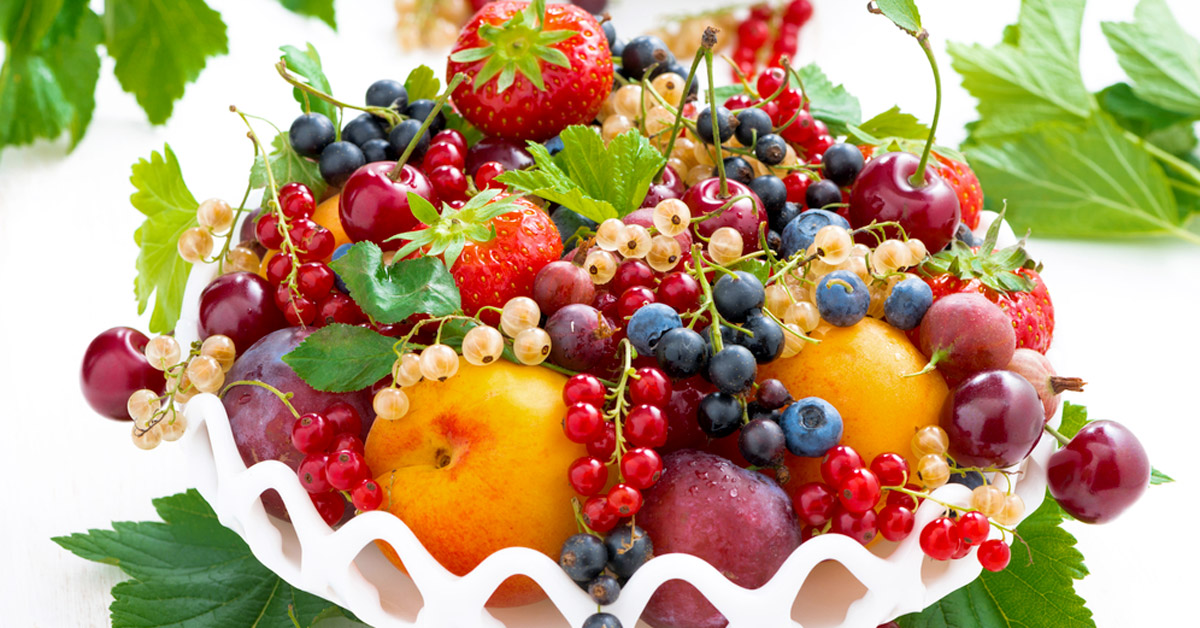
The important role of healthy snacks in the diet
Overeating of any kind is likely to lead to weight gain, in the long term. And unhealthy snacks – like crisps, biscuits and fizzy drinks – should certainly be limited to being just a very occasional treat. But there is compelling scientific evidence that nutritious snacks can – and indeed should – form part of a healthy balanced diet. According to the Mayo Clinic, choosing healthy snacks can help to both manage hunger, in the short-term, and reduce the likelihood of bingeing when it comes to mealtimes. But the trick is to choose snacks that can kick hunger into touch while, at the same time, be nutritionally beneficial and keep calorie counts low.
Kids' stuff
The evidence to support the positive role of snacking is even more compelling when it comes to kids. Childhood is a time when young bodies are growing rapidly, and any parent will confirm, kids shoot up fast. But children have smaller stomachs than adults meaning that they usually feel fuller quicker. According to a 2009 study by the WHO, snacking can be a good way for children to meet their extra nutritional needs and to support normal development. Why not give our Prune Energy Balls recipe a go? They're tasty, healthy, easily-made and can last up to a week!
Trends in snacking
In today’s on-the-run society the temptation of the quick-fix convenient snack, often in the form of the nutritional bar, may appear to be just what a hungry tummy ordered. Clever advertising may suggest health values, however, nutritionists agree that not all nutritional bars are created equal! Many are high in refined sugar and can have as much saturated fat as a regular confectionary bar.
A recent Mintel report on snacking suggests that there is a growing preference for healthy food choices. And young people - the Millennial generation of 21 to 38 year olds, for example – were likely to snack for function and focus, with 39% snacking to get an energy boost. And California prunes tick lots of these boxes.
- Sweet (Prunes contain only naturally occurring sugars, with no added sugar.)
- Super-tasty
- Packed with nutrients
- Low Glycaemic Index (GI) of 29, which means that their sugar is released relatively slowly on digestion, helping to avoid the “rush-and-slump” that can be associated with other snacks.
It makes dietary sense to have a repertoire of easily prepared snacks up your sleeve, ideally ones that can be made advance, are suitable for the whole family and can be enjoyed whenever you're on the run. Think school lunch boxes, pre or post-exercise pick-me-ups, an office 'deskfast'. Check out our Prune Energy Balls - tasty, satisfying and nutritious.
Please Note: Prunes are good for digestion and help keep you regular, when 100g are eaten as part of a varied and balanced diet and an active lifestyle. Always consult a GP if you have any health concerns.
Boost your happiness and wellbeing by spreading some Gratitude. It’s scientifically proven!
Posted Fri, Jun 11, 21 by Sunsweet
Super simple ways to significantly – and sustainably - boost your happiness levels and enhance your physical and emotional wellbeing, in the process. Read on for research-based evidence about accentuating the positive and getting grateful. Start small and – before you know it – you'll have a whole heap of happy!

Start loving the Gratitude!
The Spring can be a great time for an overhaul. A chance to rid ourselves – once and for all - of the old habits that no longer serve us and to embrace some healthy, new ones. Habits like acknowledging events - like Mother's Day and Easter - and commemorating them, in a way that feels meaningful to you. Habits like celebrating successes large and small. Habits like noticing the positives, however tiny they may be, and expressing gratitude for them. And there's research-based evidence about the value – from both an emotional and a physical point of view – for making these super-simple step changes to your everyday habits.
The Science of Celebration
The Greater Good Science Center (GGSC), at the University of Berkeley, offers up some compelling reasons for all of us to get into the gratitude habit. Because according to Juliana Breines, writing on the organisation's website, happiness research – spanning some 20 years – has one key message for us all: give thanks.
After analysing the results of countless scientific studies, the GGSC found that developing an attitude of gratitude can, amongst other things:
- have a positive impact on our emotional wellbeing and on our relationships
- reduce our likelihood of becoming depressed
- increase our resilience when faced with life's many and inevitable challenges
Grumbling and thinking negatively can, all too easily, become a habit. If you look at the messages that we're bombarded with - from the myriad 24/7 news channels, for example - the vibe is predominantly downbeat. But there's no need to panic. The GGSC have come up with four simple tips that should help you to cultivate a healthy sense of gratitude, no matter what life throws at you!
Get Grateful: In 4 Simple Steps
- Count your blessings
Remember that even on the very worst of days, something positive will have happened. Spend a few minutes jotting down these good things, however small or insignificant they may seem. According to a study by the Positive Psychology Center, at the University of Pennsylvania, “completing this exercise every day for one week led to increases in happiness that persisted for six months”. Impressive stuff!
- Mental subtraction
Without stressing yourself out too much in the process … imagine that something you currently have is gone. Applied to possessions, to jobs and even to people, this simple trick alone might be just enough to make you appreciate those things and to stop taking them for granted!
- Savour
In their book, “Savoring: A New Model of Positive Experience”, Fred B. Bryant and Joseph Veroff extol the virtues of a regular “Savoring Walk”. Walking for just 20 minutes, on your own, every week and paying hyper-close attention to the sights, smells and so on of your surroundings can – the authors found - have a positive effect on your happiness levels, a full week later.
- Say “Thank You”
Really, could it get much more simple than that? And just imagine the warm glow that the recipients of your gratitude will experience, too. Now, that's what we call a win-win.
Reasons to feel grateful – think prunes!
And while we're feeling celebratory and expressing gratitude for the small things, let's hear it for the prunes!
Prunes; A super-quick and fruity snack. A rich, indulgent note in an elaborate feast. And lots of things in-between. Convenient, natural and a wonderfully versatile addition to a range of dishes, both sweet and savoury - really do deserve a dollop of gratitude.
So, we've acknowledged that prunes are delicious but did you know that they're actually pretty good for you, too? Follow the link to discover even more reasons for you to be grateful for Sunsweet prunes!
Please Note: Prunes are good for digestion and help keep you regular, when 100g are eaten as part of a varied and balanced diet and an active lifestyle. Always consult a GP if you have any health concerns.
Delicious Christmas gifts for the Foodie in your life
Posted Fri, Jun 11, 21 by Sunsweet
We hate to have to break it to you, but Christmas is just around the corner! So what do you reckon, could this be the year that – with a little forward planning - you manage to minimise the stress, maximise the joy and makes lots of happy, family memories along the way?

In the age of technology, the pressure to create a flawless and fashionable family Christmas can start to mount. Social media is awash with sumptuous and stylish images that are far beyond the reaches of most of us. But before you get swept away and dispirited by unattainable standards, why not take a little time to get to the bottom of what the spirit of Christmas actually means for your family? If you’re anything like us, family and friends, festive foods and fun will certainly come close to the top of the list!
So this year, why not get organised ahead of time and set aside a day or so to rustle up some delicious foodie gifts for your nearest and dearest? Get the whole family involved because kids of all ages really do have a part to play. Even the tiniest of tots can help to decorate the labels for bottles and jars, for example. And what a wonderfully creative way to spend a gloomy autumnal weekend; filling your own home with aromas that will conjure up the festive season while creating unique and scrumptious gifts that have a truly personal touch!
The positive psychology behind homemade gifts
According to Allison Pugh, a sociologist at the University of Virginia, gift-giving is “an expression of truly seeing the other person and knowing what they want." And who wouldn’t want a festive spiced Christmas cake, jewel-coloured jars of chutneys and preserves or – for the more decadent people on your gift list – bottles of alcohol-marinated fruits? Home-made foodie treats make for Christmas gifts that go on giving long into the New Year. A study published in the Journal of Marketing discovered that people felt that homemade items showed more love and that – generally speaking - love is the message that people wanted to express. The study’s authors found that handmade products were perceived to be, “literally imbued with love." And Allison Pugh is in agreement, “If gifts are about expressing and forging love, one of the best ways to do that is with your own time. That will always be a really powerful gift." We couldn’t agree more!
Delicious edible gifts
Our easy-to-make Prune and Orange Marmalade and fragrant Prune Chutney are excellent places to start. Why not make a double batch and pop a jar of each into everybody’s stocking? If you fancy trying your hand at something a little more challenging, our Prune Biscotti with White Chocolate and Prune Stollen are well worth the effort! Although biscotti are best eaten within 4 weeks, they can be stored in a sealed container for up to 8 weeks. And stollen will last for several weeks if covered and kept in a cool, dry place. In fact, the loaves actually become more moist and flavourful as they age. Decant your bakes into pretty bags or boxes just before gifting. Getting your little ones to create hand-written labels with serving suggestions is a lovely finishing touch. The Prune Stollen, for example, is delicious toasted and served warm with a generous dollop of our Prune and Orange Marmalade.
Enjoy!
Please Note: Prunes are good for digestion and help keep you regular, when 100g are eaten as part of a varied and balanced diet and an active lifestyle. Always consult a GP if you have any health concerns.
Dietary Fibre 101
Posted Fri, Feb 21, 20 by Sunsweet
What exactly is fibre? Why does the body - every body - need it? What happens to our body if we don’t get enough of it? And how can we ensure that we keep getting plenty of it? Read on for everything you - and your family - need to know about dietary fibre.
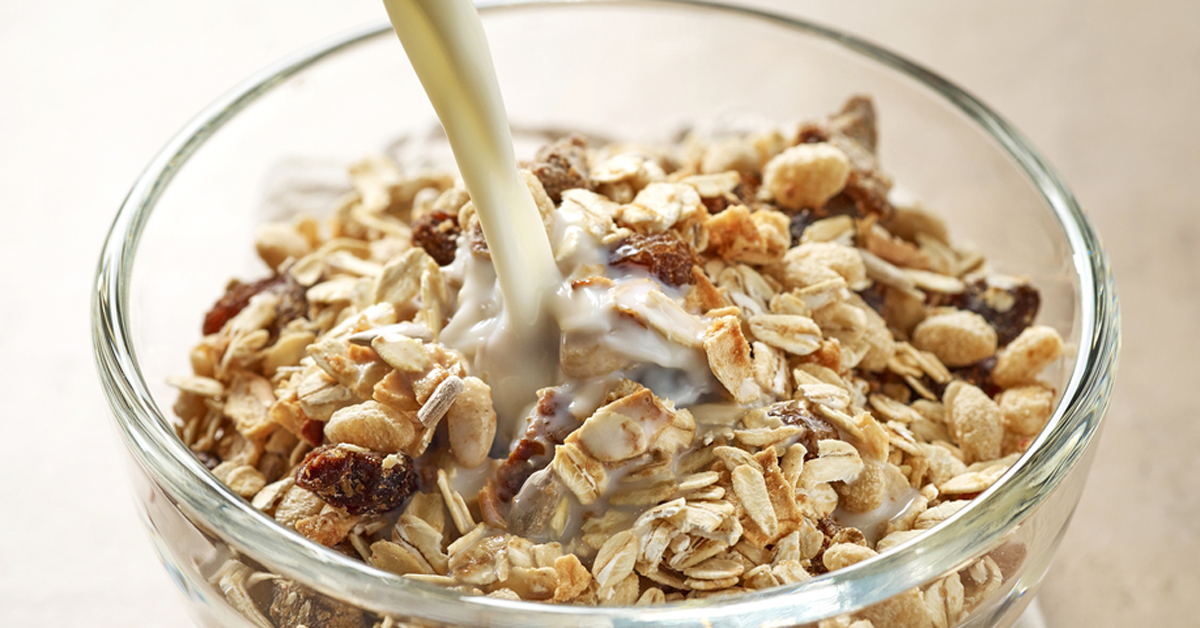
Our Dietary Fibre 101
OK. We admit that as health topics go, dietary fibre - and the role that it can play in contributing towards a healthy and normally functioning body – is far from being a glamorous one. And yet, dietary fibre is an important health topic. With a seemingly endless increase of pressure on our time and the proliferation of quick, convenient and very nutrient-poor meals, many of us simply do not get enough fibre from the food we eat on a regular basis.
But what is dietary fibre?
In a nutshell, dietary fibre is the tiny parts of things like cereal, vegetables and fruit that cannot be digested in the small intestine. Instead, this dietary fibre passes further along in the digestive system before most of it gets broken down by bacterial action in the colon. Increasing dietary fibre – as part of a healthy and balanced diet - can help to soften stools, making them easier to pass and helping to keep the complex cogs of the digestive system moving!
If you would like a more detailed understanding of how the digestive system works then our 'whistle stop tour of the digestive system' will be of interest to you.
And it seems that fibre has an even more crucial role to play, too. The World Cancer Research Fund (WCRF) reckon that dietary fibre is protective against bowel cancer. Around 12% of bowel cancers in the UK are linked to eating insufficient fibre, less than 23 grams a day.
Types of dietary fibre
Dietary fibre is typically divided into two groups:
- Insoluble Fibre:
This is made up of the skins of fruits, the stalks and leaves of vegetables and the husks and hard coats of seeds. Insoluble fibre is more slowly broken down and its bulk helps with the evacuation of stools.
- Soluble Fibre:
This is more completely fermented in the colon, it retains fluid, softening the stools and making them easier to pass.
Many plant components contain both soluble and insoluble components of dietary fibre. For example, the skins of prunes are composed of insoluble fibre and the pulp and juice are composed of soluble fibre
Dealing with constipation
If you do become constipated, it is even more important than ever to aim for at least 5 portions of fruit or vegetables a day. Fibre-packed dried fruits and natural, unsweetened juices can both count towards this target. Just three prunes a day count for one of your ‘5-a-day’ portions!
Highly processed foods are best avoided as these tend to be higher in fat, salt and sugar and are often lower in fibre. Get into the home-cooking habit. Our recipe pages are a great place to look, for healthy inspiration.
The role of fluids
To help to keep things moving, digestively-speaking, it’s important to make sure that you drink plenty of fluid. If you’re actively taking steps to increase the amount of fibre in your diet, be sure to increase the amount of fluid that you drink, too. The body is super-efficient at extracting fluid from the colon when it is needed for bodily functions. And even slight dehydration can lead to harder stools that are more difficult to pass. Six to eight glasses of fluid a day - water or diluted fruit juices are good choices – is a useful rule of thumb.
If you’d like to find out more about the role of dietary fibre – especially if you suffer from IBS with constipation – please do take a look at our booklet. It’s packed with expert hints and tips:
Please Note: Prunes are good for digestion and help keep you regular, when 100g are eaten as part of a varied and balanced diet and an active lifestyle. Always consult a GP if you have any health concerns.
Don't let stress play havoc with your health, this Christmas!
Posted Fri, Dec 13, 19 by Sunsweet
Stress. An inevitable part of modern life, especially at Christmas? Or something that we can – and should – take steps to influence and improve? Slow down the pace, this Christmas, and - you never know – you might actually enjoy it! Check out our tips on reducing those health-impacting stresses to enjoy more precious time with family and friends.

Can you make this Christmas your happiest and healthiest yet?
There's a school of thought that stress is an inevitable aspect of contemporary life. And we all know that Christmas can be an emotionally challenging time; a heady combination of family ‘differences’, money worries, general fatigue and the slipping of healthy habits, , can play havoc with our stress levels.
Stress – a widespread issue
The World Health Organisation defines stress as “the reaction people may have when presented with demands and pressures that are not matched to their knowledge and abilities and which challenge their ability to cope”. Most of us can relate, in some way, to those feelings, especially at Christmas. Expectations are sky-high but with so much going on, often the energy levels and resources, required to deliver on those expectations, can be low. So what can you do to help reduce stress in your life?
Stress-busting tips
Here are three things that you could try, today,:
- Try to figure out the source of your stress, if you can. It could be your place of work. It could be your home. The places where we spend most of our time are good places to start in tracking down that source.
- Where possible, identify the steps that you could take to effect positive changes. And then make those steps. Start with small changes, at first, especially if you're feeling vulnerable.
- Make sure that you have some stress-busting strategies at your fingertips. Listen to soothing music. Practice mindfulness. Chat to a friend. Go for a walk. Take a long, hot bath. These are all excellent methods of de-stressing and couldn't be more simple.
Stress and tummy troubles
Digestion is a super-sensitive process, all too easily compromised by the stresses and strains of contemporary living. Stress can exacerbate a range of symptoms – including poor appetite and tummy troubles. These vary from person to person, but when the digestive system gets out of step – for whatever reason - the entire body can feel its unwelcome effects like bloating, constipation and indigestion.
Prunes can help!
Prunes have long been associated with digestive health and now there are scientific findings to support this. Research suggests that prunes should be considered as “a first line therapy” to maintain a healthy bowel. The research found that when 100g of prunes were eaten on a daily basis, they helped to support normal bowel function.
Why not check out our Digestion 101, too, to discover more hints and tips on maintaining a healthy digestive system?
With our very best wishes for a healthy, happy and stress-free Christmas!
Exercise: the “miracle” cure. Tips on how to make it work for you!
Posted Fri, Jun 11, 21 by Sunsweet
They call it the ‘miracle cure’...it’s free, has immediate effect, it’s sociable, fun, suitable for all ages, good weather, bad weather, and, there’s now scientific evidence to prove it can help not only reduce your risk of succumbing to major illness but also help you lead a healthier and ever happier life. It's...exercise! Did that come as something of a surprise?

“If exercise were a pill, it would be one of the most cost-effective drugs ever invented,” so says Dr Nick Cavill, a health promotion consultant.
The many benefits of regular exercise
And it's true that the positive arguments for regular exercise certainly cannot be overstated. People who exercise typically experience health benefits in the following areas, amongst many others, meaning that they can enjoy a healthier and even happier life:
- Digestive health
- Coronary heart disease and stroke
- Type 2 diabetes
- Certain types of cancer
- Osteoarthritis, hip fracture and falls (in older adults)
- Depression
- Dementia
*Source: http://www.nhs.uk/Livewell/fitness/Pages/whybeactive.aspx
How much should we be getting?
Although daily activity is important, adults should generally be aiming for a minimum of 150 minutes of exercise over the course of a typical week. Over the winter though, when the days are short, the weather is lousy and – at Christmas, in particular – the demands on our time are dizzying, it can be all too easy to let healthy habits slide. But spring is the perfect time for a fresh start, to overhaul routines for healthy living, to shake off that sense of winter sluggishness – both mental and physical - and to step towards the summer with confidence, positivity and bags of energy. So what are you waiting for?
5 tips to get you moving!
- Choose something that you really enjoy whether that's running or cycling or bopping around the house like a teenager!
- Team up with similarly enthusiastic people, you'll up the fun quotient and be much more likely to stick to the arrangements that you've made.
- Multi-task. We're all busy, these days, so bundling activities together might help to boost your motivation. Spend time with the kids, exercise the dog and get yourself hot and sweaty by organising a high-intensity kick-about in the park. Roll up your sleeves, pump up the stereo and spring clean the house. You get the idea!
- Make moving your body an integral part of your day-to-day life. If you need to make an extra special effort, you might find that you start to make excuses or that exercise slips off your priority list.
- And finally... Try not to make excuses. Yes, our lives are generally more sedentary these days. Yes, we are increasingly tied to our technology. But if you're not going to take responsibility for your own health, then who is?
Fuel that workout!
For a nutrient-packed and perfectly portable pre-workout snack, why not consider the not-so-humble prune? Naturally sweet, prunes have a low GI meaning that they release their energy relatively slowly to satisfy your sweetie-cravings without giving you the short-term energy rush and sugar-crash of so many other snacks. Prunes are scientifically-proven to help with digestion, a great way to help overcome sensations of inner sluggishness. You might be interested in our Digestion 101, too, to discover more about the health boosting properties of prunes.
Have a happy spring!
Please Note: Prunes are good for digestion and help keep you regular, when 100g are eaten as part of a varied and balanced diet and an active lifestyle. Always consult a GP if you have any health concerns.
Get Healthy. Get Motivated. Get Sociable.
Posted Thu, May 13, 21 by Sunsweet
It’s the perfect time of year to establish those healthy foundations that will help you to sail through the winter. But if you're concerned about your resolve and motivation for regular exercise slipping, why not get a group of friends and family together, with social distancing as is comfortable for all of you, and get moving?

Having the support of friends and family is a very strong motivator to lacing up those runners and to get going! Not only is being sociable written into our DNA but studies have found that exercising with a friend is more fun, helps you to stay in shape and gets you out of the house. A study of 1000 women found that 31 per cent consider their friends to be the motivation they need to stay in shape! And, what’s more, there can be a lot of truth in the cliché, “Friends and Families who play together, stay together”. So, when you consider the stats about how much more motivating it is to exercise with a buddy or two, it really does make sense to get a posse together. It’s all good - No excuse!
Four tips to getting a posse of friends together!
- Get sociable and start to recruit your motivator posse
- Get creative and brainstorm ideas for trips out and activities
- Get picnicking
- Get planning
The school gates. The office. The gym. Your friends on Social media. These are all rich sources for members of your gang. In fact, anywhere is. Be inclusive. Ask people to invite a friend. And a friend of a friend. When it comes to your posse going, the more, the merrier!
Perhaps there's a park near you, with a walking trail. (Tea room a bonus!). Zumba class, swimming, Yoga, boot camp, lunchtime or evening brisk walk, hiking, cycling, dance classes, Pilates. Or what about staging an old fashioned sports day in the local park? Rounders. Egg and spoon races. Tag. All excellent fun, whatever your age.
There's something so scrumptious about food eaten out of doors, when you've done a bit of exercise to work up a healthy appetite! Check out our recipes pages for yummy and portable, prune-related ideas.
When are you going to meet? Every month? Every fortnight? Every week? Get some dates in the diary. Make sure that you're all committed to sticking to those dates. After all, a few spots of rain never hurt anybody!
Carpe Diem
Autumn is the perfect time of the year to establish some solid foundations – around diet and exercise and all-round healthy living – that will help to see you glide, effortlessly and healthily, through the long, winter months ahead. What’s more, there are often a few quieter weeks to be savoured, in the Autumn - a welcome little breathing space between the stresses and strains of our summer travels and the coming chaos of all-things Christmas.
So, with a little help and motivation from our friends, the perfect time is right now to, Seize the Moment!
Healthy Hacks for Winter Snacks
Posted Fri, Jun 11, 21 by Sunsweet
No matter what your age or life-stage, life is busy. And snacking is just an everyday part of our busy, contemporary lives. Although many of us will eat more snacks over the course of a day than we realise, there’s nothing inherently wrong with snacking. Of course, overeating – no matter what food you plump for - is likely to result in weight gain. But there’s evidence to suggest that nutritious snacks can – and indeed should – form part of a healthy balanced diet.
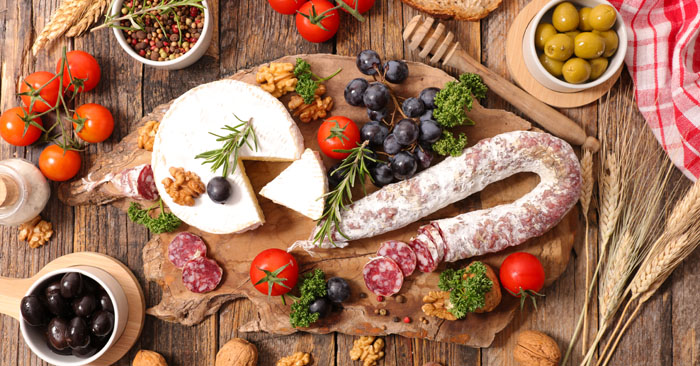
Choosing healthy snacks can help to manage hunger, in the short-term, and reduce the likelihood of bingeing at mealtimes. Nourishing and warming snacks can give our bodies a much-needed boost on dark and cold days. In cold and flu season, immune-system boosting nutrition is more important than ever. And for children – who tend to shoot up suddenly - it’s important to fuel growth spurts with nutritious food choices. Children have smaller stomachs than adults, though, meaning that they feel fuller quicker and so snacking can be a good way to meet those extra nutritional needs. The trick is to choose snacks that can kick hunger into touch while, at the same time, being nutritionally beneficial and keeping calorie counts low.
So how can that be done?
When hunger strikes, it’s all too easy to grab whatever is to hand. And if it’s chocolate bars and packets of crisps that are to hand, it can be extremely difficult to resist temptation. But foodstuffs that are high in sugar, saturated fat and salt can - over time - lead to health problems like heart attacks, strokes and diabetes.
Fruit has an important role to play in healthy snacking. And dried fruit like prunes – with their lengthy shelf-life - can offer a tasty, convenient and healthy choice.
Portion control is important when making between-meals choices, try to limit snacks to about 100 calories. Enjoyed straight from the pack, four Sunsweet prunes make a deliciously sweet treat.
When choosing drinks, try to consider their health benefits, too. Hot chocolate is a lovely, warming treat but warm fruit-juice based drinks can be just as satisfying and pack a nutritious punch, too. We have a lovely selection on our website.
For perfectly portable, flavour-packed treats that the whole family will love, why not hop over to YouTube and check out our video for a step-by-step guide to making Energy Balls?
And did you know?
Prunes have a low Glycaemic Index (GI) of 29, which means that their sugar is released relatively slowly on digestion, helping to avoid the "rush-and-slump" that can be associated with other snacks.
Please Note: Prunes are good for digestion and help keep you regular, when 100g are eaten as part of a varied and balanced diet and an active lifestyle. Always consult a GP if you have any health concerns.
Introducing Our New Pack! New Look, Same Great Juice!
Posted Fri, Jun 11, 21 by Sunsweet

Our New Prune Juice Pack Makeover
These cartons use much less plastic and are created with sustainable wood fibre from FSC certified wood. And while the plastic bottles we used are recyclable we feel it’s about time for a makeover!
- The cartons have an easy open screw-top lid and the pack is easy to handle and pour.
- The square shape fits conveniently in your fridge door so you can continue to enjoy your prune juice chilled.
- And, of course, the new packaging keeps your favourite Sunsweet Prune Juice tasting just as scrumptious as ever.
Mmm...Prune Juice Recipes
Nutritional Benefits of Prune Juice
There are many reasons for including prune juice in your diet. The great, naturally sweet flavour, convenient refreshment, or the many nutritional benefits such as fibre, potassium and sorbitol.
Now you can add helping the environment to the list!
Whether you enjoy your prune juice in a smoothie, straight up, or on the rocks, you can be sure that the package it came in won’t end up, well, on the rocks :)
Sunsweet Prune Juice has no fat, no salt, no additives and now no plastic bottle.
We think that’s worth raising a glass to!
Is five-a-day still enough? When it comes to fruit and veg, more is definitely more.
Posted Fri, Jun 11, 21 by Sunsweet
With scientific studies now suggesting that five-a-day may no longer be enough, how can we ensure that our family are getting the fruit and veg that they need, for optimum health, while keeping things interesting – and tasty – at mealtimes?
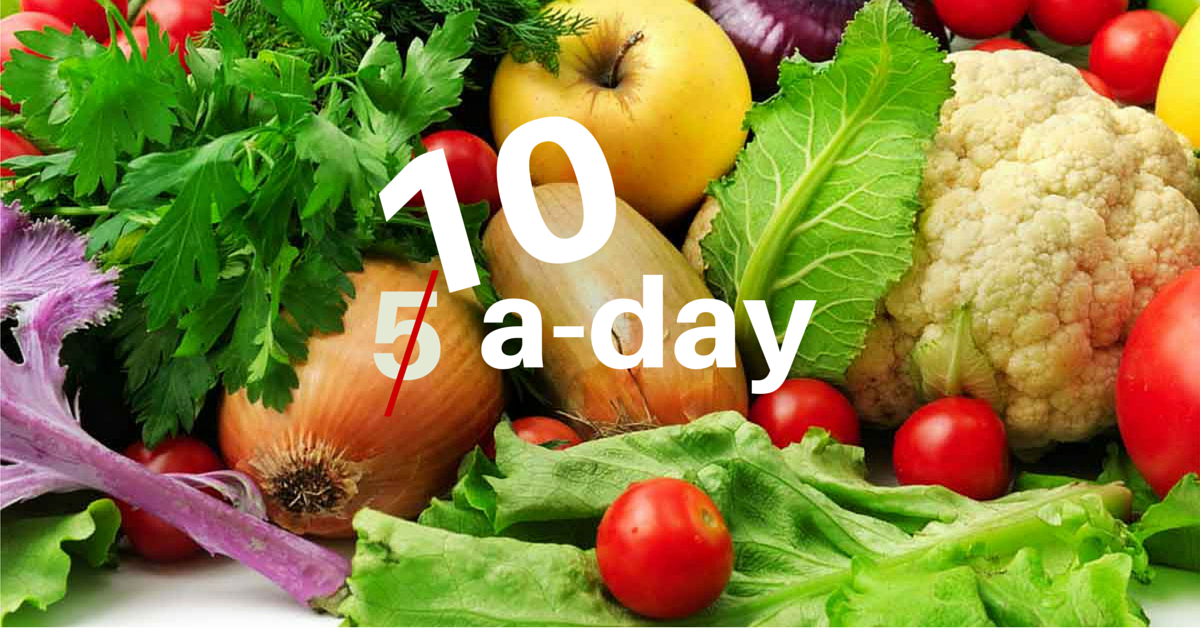
Summer is a great opportunity to finally step into the sunny season with confidence, positivity and gratitude. Phew! And the perfect fuel for all of that? Delicious fruit and veg and plenty of it!
So, is five-a-day still enough?
Based on the World Health Organisation's recommendations, the five-a-day fruit and veg guidelines were introduced in 1990 with the aim of lowering the risk of heart disease, stroke, diabetes and obesity. Almost a third of us struggle to regularly get our five-a-day. But a 12-year study, 2001 – 2013, by University College London has found that we may benefit from actually doubling-up on the official guidelines and aiming for ten portions of fruit and veg a day instead, to significantly lower the risk of premature death. The study’s lead author, Dr Oyinlola Oyebode, went on record to say: “The clear message here is that the more fruit and vegetables you eat, the less likely you are to die at any age. My advice would be however much you are eating now, eat more.”
Variety – the spice of a healthy life
Whether your fruit and veg is tinned, fresh, frozen or dried – like scrummy Sunsweet prunes – it all counts towards your five-a-day. Great news, especially if you're aiming for the more ambitious ten daily portions! The trick is to keep things interesting, so that you and your family don't get bored. And a really great way to do that is to try – for as many of your meals as possible – to have a seasonable focus to the ingredients that you choose.
Did you know that just three prunes count for one of your daily portions? This is great news, especially if you're aiming for the more ambitious ten daily portions! The trick is to keep things interesting, so that you and your family don't get bored. A really great way to do that is to try – for as many of your meals as possible – to have a seasonable focus to the ingredients that you choose. Our recipes pages have lots of inspirational breakfast, mains, salads, desert & sweet treats, salads etc ideas to help you on your way.
Seasonable Treats
With the changing of the seasons, there's something lovely about taking advantage of the natural diversity – the flavours, the textures, the scents and the colours – of seasonable foods. And it's a great way for you and your family to ring the changes at meal-times and to try lots of different foodstuffs throughout the year. Wild garlic, morels and salad staples like spring onions, watercress and rocket are all excellent at this time of the year and make superb foundations for the lighter dishes of springtime as we naturally gravitate away from winter stodge. And if you're feeling inspired by all-things seasonable, why not try growing your own?
Grow your own!
Growing your own is easier than you might think. Vegetable gardening – with a raised bed or even just a handful of pots – is a great excuse to get the whole family out into the fresh air. And eating healthful foods - that you have watched grow from seed – can help to tempt even the fussiest of eaters into trying new things. There really is something magical – for kids of all ages – in the transformation from seeds to shoots to something scrummy. Salads are a super-simple starting point. A sunny spot. Plenty of water. And you really can't go wrong.
And finally...
You can check out Sunsweet's eco credentials, here:
Please Note: Prunes are good for digestion and help keep you regular, when 100g are eaten as part of a varied and balanced diet and an active lifestyle. Always consult a GP if you have any health concerns.
Love your bones – with a little help from Sunsweet!
Posted Fri, Jun 11, 21 by Sunsweet
World Osteoporosis Day (

Beautiful bones!
Most of us pay very little attention to our bones. And yet they provide us with strength, protect our bodies and help us carry out everyday tasks. Did you know that bones are a living tissue, continually growing and changing? They become most dense in our early twenties but then the density starts to reduce making it important to be mindful about bone health, throughout our lives.
Signs of osteoporosis
A first fracture - most commonly affecting the hips, spine or wrists – can often be one of the first signs of osteoporosis. Osteoporosis affects one in three women and one in five men aged 50 years and over. The condition causes bones to weaken and thus break more easily and can lead to serious pain and even long-term disability. Following a hip fracture, for example, only 40% of survivors return to their pre-fracture walking ability and because walking is an important weight-bearing exercise – crucial for bone health – this can exacerbate the condition. In severe cases, even sudden movements – like sneezing – can start to cause problems.
Hints and tips
The WOD’s official website offers the following five tips for healthy bones and a fracture-free future:
- Get regular exercise: Strengthening and weight-bearing exercises – like good old walking – are excellent options.
- Eat well: Ensure your diet includes plenty of bone-healthy nutrients like calcium and vitamin D. Snacking on nuts or dried fruit can help. And did you know that prunes contain vitamin K and manganese that - among other functions - have direct benefits for bone health?
- Cut out unhealthy habits: If you’re still overeating, smoking or drinking excessively, get the help you need and stop.
- Assess your osteoporosis risk: If it’s high, you might need prescription medication to protect you.
- And if you suspect that you’re high risk? Ask your doctor to run some tests so that you can get the treatment you need.
The role of prunes
Prunes provide a number of nutrients that contribute – in different ways - to bone health:
- Vitamin K supports the maintenance of normal bones and helps with blood clotting.
- Manganese also supports the maintenance of normal bones and helps form normal connective tissue (a structural part of bones).
- Vitamin B6 helps make healthy blood cells and maintain normal hormone levels.
- Copper helps support normal iron transport in the body and also helps maintain normal connective tissues.
If you’d like to know more, why not check out our Serve Up Bone Strength fact sheet?
Please Note: Prunes are good for digestion and help keep you
Make friends with technology
Posted Fri, Jun 11, 21 by Sunsweet
In the last decade, our use of the internet has skyrocketed. It’s been blamed for many things including our increasingly sedentary lifestyles. And yet it remains a significant part of our everyday lives despite all of the negative and downright fear-mongering headlines. But can technology actually have a role to play, in helping us to create balanced, happy and healthy lives?

Despite being a huge part of modern lives, the online world often gets a bad rap. If you believe what you read in the press, we’ve replaced couch potato habits for mouse potato habits – equally sedentary and unhealthy - and spend every spare moment surfing the net. Social media – in all its iterations - has been blamed for poor body image and low self-esteem across the entire range of demographic groups. And there seems to be a grain of truth behind the fear.
In England alone, according to the UK communications regulator, Ofcom, people now spend twice as much time online compared with 10 years ago and it would be safe to assume that it is a similar story all across Europe. Much of that time, of course, is spent immobile. And stats from the medical journal, The Lancet, suggest that inadequate exercise is responsible for more than 5 million deaths globally each year. Sobering stuff.
But is there a silver lining to the techno cloud?
At its very best, the internet offers a diverse resource of up-to-date, educational material that is both entertainingly written and accessible. Much of it is absolutely free. And our blog, of course, is an excellent example! Whether you choose apps or websites, social media or online newsletters, there’s lots of content out there to support you in your quest for a healthier lifestyle. Check out our top 3 techno tips, be selective and get informed.
- Newsletters – Choose reputable sources
Sign up to a couple of lifestyle-related online newsletters. Choose ones from trusted sources, that cover topics that interest you – info overload is not our goal, here – and get inspired with everything from recipes for healthy and speedy mid-week dinners to tips on keeping active, whatever the time of year.
- Workout Videos Online
Don't let good habits around physical activity slip. It’s far better to maintain an exercise programme throughout the year so that it becomes just another part of your daily routine, something that’s as automatic as brushing your teeth. And this is another area where technology can be your ally. Whatever form of exercise you enjoy – from boxercise to yogalates – you’ll be sure to find an online workout that floats your boat. Bung a one-pot-wonder into the oven – remember to keep things healthy! – and, while it cooks, pop on your workout video of choice and get moving.
- Monitoring Fitness Progress
Whether it’s monitoring your daily calorie intake with sophisticated food diaries, tracking your levels of physical activity, learning relaxation techniques like mindfulness or even keeping an eye on your menstrual cycle, there’s an app for that! Speaking to Fox News, Scott Snyder – an innovator in the field – said, “The ultimate goal of most of these apps is to change behaviour. Small changes are a big overall win for health.” We couldn’t agree more!
As with most things, getting a good balance is crucially important. Everything in moderation – including technology – and you won’t go far wrong!
Looking for more inspiration? Why not check out our Healthy Living Guide?
Please Note: Prunes are good for digestion and help keep you regular, when 100g are eaten as part of a varied and balanced diet and an active lifestyle. Always consult a GP if you have any health concerns.
Positive steps towards maintaining a healthy weight
Posted Fri, Jun 11, 21 by Sunsweet
If you believe the headlines, obesity has reached epidemic proportions. Our kids are fatter than ever. Adult health is being negatively affected by expanding waistlines with the results being a greater propensity for cancer, heart disease, diabetes. It’s enough to make you reach for a chocolate bar. But hold that thought! It’s never too late to do something positive about weight management.

Comfort Eating
The links between stress, comfort eating on high-fat, sugar-laden foodstuffs and subsequent weight gain cannot be ignored. According to a study by the American Psychological Association, a quarter of Americans rate their stress level – on a ten-point scale - as 8+. And stress certainly seems to have an adverse impact on our food preferences. When the going gets tough, we reach for the buns! And, when we’re stressed, we also sleep less, exercise less and drink more alcohol. None of which are great for the waistline.
Researchers at Harvard University offer a trio of common-sense tips for countering stress:
- Meditation: The practice will help you to become more mindful of your moods and better able to make healthy food choices.
- Exercise: Activities like yoga and tai chi combine exercise and meditation – a win-win!
- Social support: A listening ear, when you need to offload, from a supportive member of your network of contacts – choose that ear wisely, it could be a friend, a family member or colleague – can also help to alleviate the symptoms of stress.
Removing Temptation
A sensible step when it comes to weight management is – wherever possible - removing temptation. Having your favourite comfort foods on tap is just asking for trouble. Stock up on fresh fruit and veg. Replace biscuits and crisps with dried fruit and nuts. Swap fizzy drinks for juices with no-added sugar. A few simple switches could make a world of difference.
How can Prunes Help with Weight Loss?
Prunes are sweet, really tasty and versatile – whether eaten straight from the pack or as a flavourful addition to a favourite recipe. But you might be surprised to read that, according to research by the University of Liverpool, eating prunes can actively help to boost weight loss.
The University’s study of 100 people (men and women) tested whether, over a 3-month period, eating the fruit - as part of a weight loss diet - helped or hindered weight control. The results were interesting, discovering that the prune eaters experienced greater weight loss than the control group during the last four weeks of the study and - after week eight – experienced greater satiety. They felt fuller. Dr Jo Harrold, who led the research, said: "Prunes may be beneficial to dieters by tackling hunger and satisfying appetite; a major challenge when you are trying to maintain weight loss."
Be Prepared!
With a well-stocked fruit bowl, a selection of dried fruits and some natural juices to hand, a healthy snack is never too far away. Smoothies are sweet and satisfying and can be whizzed up in seconds. And a handful of prunes – enjoyed on their own – couldn’t be more convenient. You can check out our recipe pages too, for lots of healthy inspiration!
PS: Did you know that prunes can be included in a wide range of special diets? Whether you are gluten intolerant, diabetic, a vegan or a vegetarian, you can find out more about the health benefits of prunes, here on our FAQ pages
Please Note: Prunes are good for digestion and help keep you regular, when 100g are eaten as part of a varied and balanced diet and an active lifestyle. Always consult a GP if you have any health concerns.
Prune Juice: the Tasty, Versatile Juice
Posted Wed, Dec 21, 22 by Sunsweet
Naturally Sweet Tasting with no Additives
Prune juice is made from high quality, sun-dried California prunes, which undergo a unique harvesting process that helps make the prunes juicier and sweeter. Sunsweet prune juice has no added sugar or other additives. Its distinctive dark colour is entirely natural and it has no nasty additives like acidity regulators or flavourings.It is naturally fat-free - great if you’re trying to reduce your intake of saturated fat. Reducing saturated fat consumption helps maintain normal blood cholesterol levels.
And because it’s naturally salt-free – this helps reduce sodium consumption which can help maintain normal blood pressure. And while all fruit juices are naturally free from salt and fat, unlike most other fruit juices, prune juice also contains fibre. Few other fruit juices contain meaningful amounts of fibre as it is often lost during the juicing process. So although insoluble fibre is removed after juicing, soluble fibre remains in the juice.
In addition, prune juice contains sorbitol. Sorbitol is a polyol, or complex carbohydrate, which acts like a sponge – it attracts and holds water in the bowel. Not all of the sorbitol consumed is digested, which is what makes it useful. All of this and it tastes great too! Which means that everyone in the family can enjoy a glass with breakfast, or as a sweet treat during the day.
Drinking Tip #1: Prune juice is great as a smoothie ingredient. If you have a blender or smoothie maker, download our free smoothie recipe booklet. Or get creative and come up with your own combinations. If you’re social savvy, why not share the love and post it on our Facebook or Instagram page? We love seeing new creations our followers concoct with our prune juice goodness!

Prune Juice and Potassium
Prune juice’s other nutritional benefit might be less familiar to most people. Like all juices it is naturally salt and fat free, but when it comes to nutritional benefits it has an edge over other juices.For example, prune juice is a good source of potassium which helps support normal blood pressure and a healthy nervous system. It also helps your muscles to work normally. Its rich, velvety taste makes it a naturally sweet way to include more of this nutrient in your diet. It’s the perfect post-workout refreshment as potassium can be lost when we sweat!
Drinking tip #2: Some people like to add ice cubes to a glass of prune juice, but it’s delicious simply served chilled from the fridge.
Make Prune Juice your Go-To Secret Ingredient for Delicious Dishes
We have lots of great recipes which include prune juice and will appeal to even to the pickiest of eaters. Kids of all ages will love our Prune and Orange Pancakes and fluffy cloud-like Baked Prune Whip.Prune juice can be used as an ingredient in smoothies which are great as a snack or for breakfast on the run. More organised breakfast-makers will love Roz Purcell’s overnight Prune Bircher recipe, just five minutes to prepare the night before and you’ll leap out of bed in the morning!
If you prefer savoury to sweet, you’ll find that prune juice is great as an addition to sauces and salad dressings. Chicken Lettuce Wrap with Asian Prune Sauce balances the tart-sweet prune juice flavour with soy sauce and rice vinegar.
Or you can keep it simple and drink a glass of chilled prune juice straight from the fridge. However you decide to include prune juice in your day, it is one drink that just might keep you smiling on the inside too.
*like all juices.
Prunes: Your Great Hack to Reducing Your Sugar Intake
Posted Thu, Mar 12, 20 by Sunsweet
As humans we’re programmed to crave high calorie foods – the survival of our ancestors depended on it. The human body evolved to make the most of high energy sweet foods when they were available, storing the excess energy for when we needed it most. These days we no longer have to hunt and gather like our ancestors (although we’ve got some great paleo recipes for anyone who follows this diet!), and we’re lucky enough not to have to worry about lengthy periods of food scarcity. But our bodies still love and crave those sugary foods which too often we don’t convert to energy and instead store in our bodies as fat.The World Health Organisation (WHO) recommends that adults limit their sugar intake to 25 grams per day – about 6 teaspoons. However, it’s easy to exceed that amount each day – depending on how you start your day you might reach your limit before you leave the breakfast table! In fact, the average consumption for adults in Western Europe is just over 100 grams of sugar, that’s about 25 teaspoons. And while you might think you limit your sugar to the teaspoon you add to your favourite cuppa, there is often sugar hidden in processed foods.
Aside from the obvious effects of sugar such as tooth decay and weight gain, there are other ways it can impact your health. According to WHO being overweight can increase the risk of:
- Diabetes
- Heart Disease
- Musculoskeletal disorders (especially osteoarthritis)
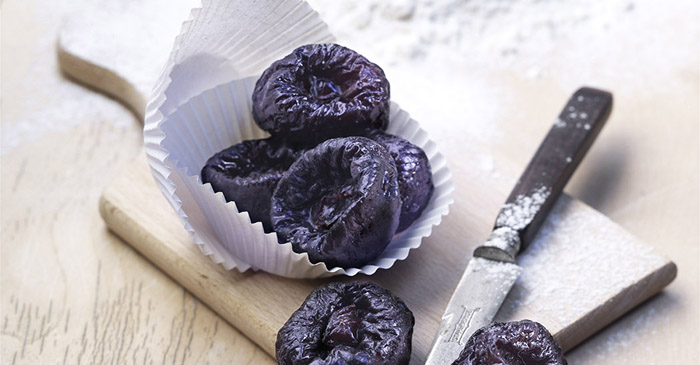
If you love cooking and baking you’ll find prunes could be your new favourite secret ingredient. You can use prunes to reduce the amount of free sugars in baking recipes. Or whip up a batch of prune puree – you can use it to reduce the total sugar content of your favourite recipe! You can even use prune purée as a substitute for butter – great for reducing the fat in your diet and for vegan recipes. Instead of serving up a bowl of cereal loaded with hidden sugars, why not start your day with a nourishing bowl of Fruity Porridge? For an afternoon treat, these Prune Muffins made with prune puree are low fat and full of fibre. Our website has lots of recipes, sweet and savoury, if you’re stuck for inspiration.
Sunsweet® Prunes and Prune Juice are dried plums from California. Prunes have a low GI-score, meaning they slowly release energy so they shouldn’t dramatically affect blood sugar or insulin levels. In addition, both prunes and prune juice contain fibre. Prunes have 7.1grams per 100grams – about a quarter of your daily needs.
Our farmers still do the gathering that our ancestors once did. They harvest the plumpest, juiciest Californian plums which are dried as prunes or made into prune juice. So next time you’re at the supermarket, hunt down a packet of delicious SUNSWEET Prunes and a carton of refreshing SUNSWEET Prune Juice!
Prunes and prune juice can be enjoyed as part of a varied and balanced diet and a healthy lifestyle. For detailed information on the nutrition content of prunes and prune juice please visit our products page.
Suffering from ‘tummy trouble’ and a sluggish digestion? Prunes can help!
Posted Fri, Jun 11, 21 by Sunsweet
For whatever the reason, when the digestive system gets out of whack the entire body can start to feel its effects. Lethargy. Bloating. Sluggishness. And even some pretty acute pain. There's good news, though. A sluggish digestion doesn't have to be endured, as just 'one of those things'. There are lots of tips for you to try, here. And the even better news? They're easy!

The discomfort and inconvenience of suffering from digestive problems, especially when you have previously been able to take a healthy digestive system for granted, can be tough to handle. There are lots of different factors that can affect digestion; from experiencing busy and stressful periods in your life, to hormonal changes triggered by pregnancy, to the natural and inevitable physical changes that go hand in hand with the aging process. Whatever the reason, if the digestive system has become chronically sluggish the entire body can wind up feeling below par, as a result.
The aging process
Digestion problems can crop up at any life stage and at any age. But according to the online medical resource, WebMD almost 40% of older adults have at least one digestive issue annually. Constipation is one of the more commonly-cited digestive complaints and with sufferers experiencing symptoms like the ones listed below, it really is no joke:
- Reduced frequency of bowel movements
- Sensations of sluggishness and bloatedness
- Painful bowel movements
- Increased risk of developing piles
Common conditions
Constipation can be caused by a whole host of factors including age-related changes in the digestive system, medication and the effects of undertaking reduced levels of physical activity and not drinking adequate fluids or eating enough fibre.
Gastroesophageal Reflux Disease – a condition that can be responsible for causing unpleasant and even painful symptoms like heartburn - is pretty common, too. The condition can be exacerbated by eating rich foods, by eating late at night and by generally eating too much because being overweight can be a trigger for the onset of the condition's symptoms.
As you age, it's important to schedule regular health checks with your doctor to discuss any symptoms that might worry you. And, of course, any sudden changes in your body should always be thoroughly investigated by your GP. As with many issues, though, preventing digestive problems – before they become chronic - is far preferable to having to treat those issues medically.
Now for the good news!
And there's some good news. Because simple and common-sense steps like maintaining a healthy weight by eating well – choosing a diet with plenty of fibre and fluids, for example - and exercising regularly are excellent starting points. Having a good understanding of the digestive basics – like opting for gut-friendly foods - can go a long way towards nipping potential problems in the bud, too. Here are our top 3 digestion-boosting tips for you to try. And they really couldn't be more simple. You can check out a more comprehensive list of easy, digestion-boosting tips, here. And there's even a whistle-stop tour of the digestive system, too!
- Mindfulness at mealtimes: sit up at the table, switch off your phone and savour your food.
- Drink plenty: water, herbal tea and fruit juices are all good choices. Avoid ice-cold drinks at mealtimes, though, they can make digestion sluggish.
- Snack on prunes: they're sweet, super-tasty and a source of fibre and sorbitol.
Here's to maintaining good digestive health, whatever your age!
Please Note: Prunes are good for digestion and help keep you regular, when 100g are eaten as part of a varied and balanced diet and an active lifestyle. Always consult a GP if you have any health concerns.





